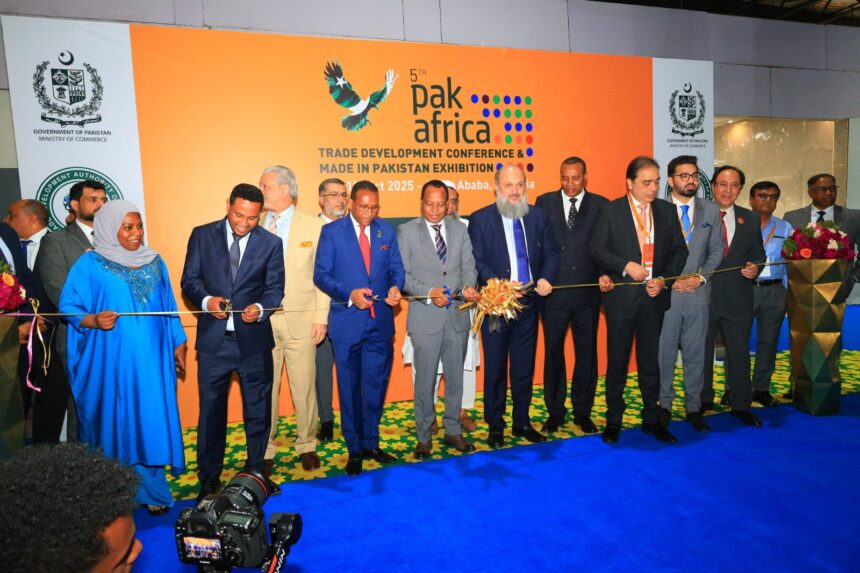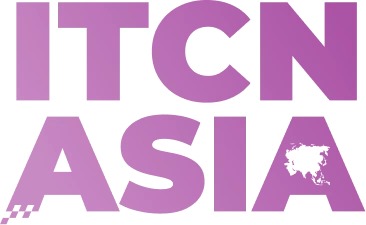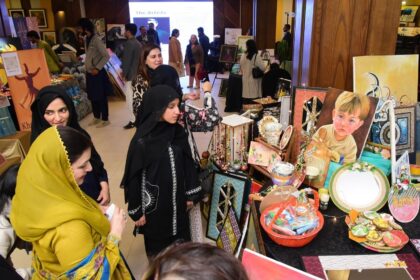<h2>5th Pakistan Africa Trade Conference Launches in Addis Ababa</h2>
The 5th Pakistan-Africa Trade Development Conference and the accompanying exhibition of Pakistani products opened at Addis Ababa Millennium Hall, drawing business delegates and government representatives to discuss expanded market access and practical trade steps. The event is positioned as a platform for direct trade-to-trade discussions, showcasing Pakistan’s goods while addressing logistical and regulatory obstacles that affect bilateral commerce.
<h2>Ethiopian Minister Highlights Strategic Pakistan Africa Trade Partnership</h2>
Deeta Abdulhakim Mulu, Minister of Trade and Licensing, said the conference and exhibition will help address business challenges and shape a forward-looking agenda focused on development. She highlighted that Pakistan and Ethiopia have a long-standing cooperative relationship and described Pakistan as a key commercial partner during Ethiopia’s economic transition. The discussion underscored mutual opportunities to deepen Pakistan Africa trade ties through exhibitions and targeted meetings.
<h3>$133M Bilateral Trade Volume Marks Growing Economic Ties</h3>
Officials reported that bilateral trade between the two countries reached $133 million in 2024, with Ethiopia’s export share at $74.4 million and imports at $58.6 million. Delegates noted the 2023 bilateral trade agreement as a step toward broadening and multiplying trade flows, and participants emphasized the need to remove non-tariff barriers, streamline customs processes and improve logistics to sustain growth in Pakistan Africa trade.
<h2>Ethiopia’s Economic Reforms Create Investment Opportunities</h2>
Dr. Abdulhakim highlighted Ethiopia’s policy reforms under the Local Economy Improvement Agenda, including measures to liberalize trade and investment, open the banking sector to foreign investors and reform tax, customs and regulatory systems to improve the business climate. She described Ethiopia as an attractive investment destination, particularly in agriculture, manufacturing and infrastructure, and reiterated the government’s commitment to industrialization that supports foreign trade and trade facilitation.
<h3>Key Sectors for Pakistan Africa Trade Expansion</h3>
The conference showcased Pakistan’s expertise in several critical sectors including textiles, pharmaceuticals, agricultural products, and information technology. Ethiopian businesses expressed strong interest in importing Pakistani textiles and pharmaceutical products, while Pakistani delegates identified opportunities in Ethiopia’s agricultural commodities and coffee exports. These sector-specific discussions aim to create concrete business partnerships that enhance Pakistan Africa trade volumes significantly.
<h2>African Continental Free Trade Area Creates New Opportunities</h2>
<p>Speakers also pointed to Ethiopia’s ongoing efforts to secure full World Trade Organization membership and said the <a href=”https://au.int/en/cfta” rel=”dofollow” target=”_blank”>African Continental Free Trade Area</a> will be an important tool for increasing intra-African commerce. Delegates expressed optimism that linking Pakistan’s workforce, creativity and expertise with Africa’s resources, markets and youthful population can generate shared prosperity and expanded <a href=”https://islamabadmail.com/category/pakistan/” rel=”dofollow”>trade opportunities between Pakistan and Ethiopia</a>.</p>
<h3>Trade Facilitation and Logistics Infrastructure</h3>
Participants identified logistics infrastructure as a critical enabler for Pakistan Africa trade growth. Discussions focused on improving maritime connectivity, establishing direct shipping routes between Karachi and East African ports, and reducing transit times for cargo. Ethiopian officials outlined plans for port development and inland logistics networks that would facilitate smoother trade flows with Pakistan and other international partners.
<h2>Exhibition Showcases Pakistani Products to African Market</h2>
The accompanying exhibition featured over 100 Pakistani companies displaying products ranging from textiles and leather goods to surgical instruments and food products. Ethiopian buyers showed particular interest in Pakistani rice varieties, construction materials, and consumer electronics. The exhibition format allowed direct B2B meetings between Pakistani exporters and Ethiopian importers, creating immediate business opportunities beyond the formal conference sessions.
<h3>Government Commitment to Expanding Pakistan Africa Trade</h3>
<p>The opening ceremony was attended by Transport and Logistics Minister Dr. Alemu Sime along with Ethiopian federal government officials and a Pakistani delegation, as exhibitors and buyers prepared for the conference sessions and product showcases aimed at boosting practical outcomes for exporters and investors. Both governments committed to streamlining visa procedures for business travelers and establishing joint working groups to monitor implementation of trade agreements. For more news on Pakistan’s regional trade initiatives, visit our <a href=”https://islamabadmail.com/category/regional/” rel=”dofollow”>regional coverage section</a> and explore our <a href=”https://islamabadmail.com/category/business/” rel=”dofollow”>business news</a>. Learn more about <a href=”https://www.wto.org/” rel=”dofollow” target=”_blank”>World Trade Organization</a> developments affecting Pakistan Africa trade.</p>











